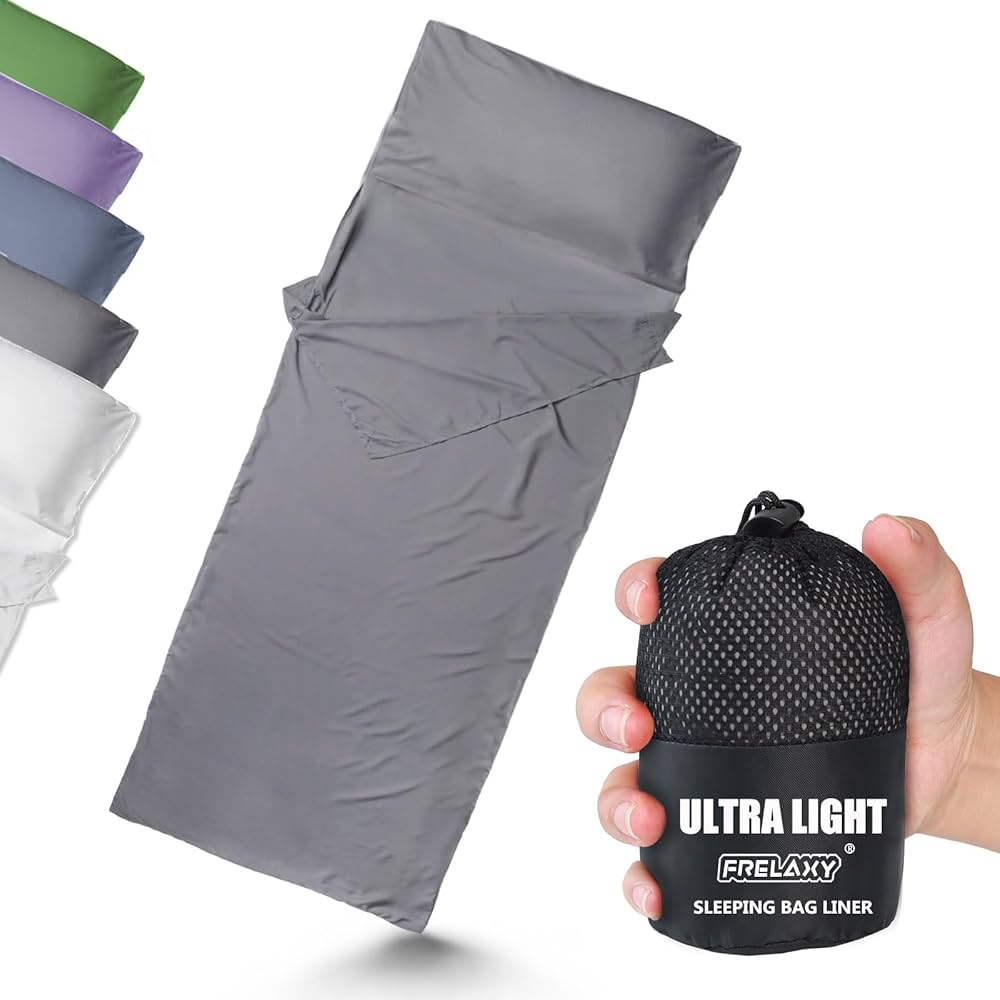Do you often wake up feeling tired, even after a full night’s sleep? Sleeping lighter might be the reason behind your restless nights.
When your sleep is too light, your body doesn’t get the deep rest it needs to recharge. But what if you could change that? What if you could enjoy peaceful, refreshing sleep every night? You’ll discover simple and effective ways how to sleep lighter without struggling or overhauling your entire routine.
Keep reading to unlock the secrets that can help you wake up feeling truly refreshed and ready to take on the day.

Credit: www.amazon.com
Causes Of Light Sleep
Light sleep can make nights feel long and tiring. Many factors cause this restless state. Understanding these causes helps improve sleep quality. Let’s explore the main reasons behind light sleep.
Stress And Anxiety
Stress and anxiety keep the mind active at night. Worries stop the brain from relaxing fully. This makes falling asleep or staying asleep hard. Stress hormones increase, disturbing deep sleep stages.
Environmental Factors
Noise, light, and temperature affect sleep deeply. Loud sounds or bright lights can wake you up. Too hot or too cold rooms make sleep uncomfortable. These factors stop the body from reaching deep rest.
Diet And Lifestyle
Caffeine and heavy meals close to bedtime affect sleep. Alcohol can cause frequent waking during the night. Lack of exercise lowers sleep quality. Poor habits keep the body alert instead of calm.
Medical Conditions
Some illnesses cause trouble sleeping deeply. Conditions like sleep apnea or restless legs syndrome wake the sleeper often. Pain or breathing problems also break sleep cycles. Treating these helps improve deep sleep time.

Credit: cyclewarehouse.online
Effects Of Light Sleep
Light sleep is a phase of sleep where your body rests but does not fully recover. It can make you feel tired even after hours of rest. Understanding the effects of light sleep helps you see why deep sleep is important for your health.
Daytime Fatigue
Light sleep does not give your body enough rest. This leads to feeling tired during the day. Fatigue makes it hard to do daily tasks. It lowers your energy and slows your reactions.
Cognitive Impairment
Light sleep affects your brain’s ability to work well. It reduces memory and focus. Problem-solving becomes harder. Learning new things takes more effort when sleep is shallow.
Mood Disturbances
Light sleep can change your mood. It may cause irritability and stress. You feel more anxious or sad. Good sleep helps keep your emotions balanced.
Weakened Immunity
Light sleep weakens your body’s defense system. It makes it easier to get sick. Your body struggles to fight infections. Deep sleep helps strengthen your immune system.
Sleep Environment Optimization
Optimizing your sleep environment helps you sleep lighter and wake up refreshed. A good setup calms your body and mind. It reduces distractions and discomfort. Simple changes make a big difference in sleep quality.
Ideal Bedroom Temperature
Keep your bedroom cool to help your body relax. The best range is between 60 and 67 degrees Fahrenheit. Cooler air lowers your core temperature. This signals your body to prepare for sleep. Avoid overheating, which can cause restlessness.
Noise Control Techniques
Noise can break your sleep easily. Use earplugs or white noise machines to block sound. Soft background noise helps mask sudden sounds. Close windows to reduce outside noise. Silence promotes a calm mind and steady sleep.
Lighting Adjustments
Dim lights before bedtime to help your brain wind down. Use blackout curtains to keep the room dark. Avoid screens at least 30 minutes before sleep. Bright light tricks your brain into thinking it is daytime. Darkness supports natural sleep rhythms.
Comfortable Bedding Choices
Choose soft, breathable bedding to stay comfortable all night. Natural fabrics like cotton or linen work best. Replace old pillows that lose support. Firm but cozy mattresses reduce aches. Comfortable bedding encourages deep, lighter sleep cycles.
Pre-sleep Routines
Pre-sleep routines play a big role in how well you sleep. They prepare your mind and body for rest. Creating calm habits before bed helps reduce stress and quiet your thoughts. This makes falling asleep easier and improves sleep quality.
Small changes in your evening routine can make a big difference. Simple steps help signal your brain that it’s time to wind down. These habits also reduce sleep disruptions through the night.
Relaxation Exercises
Relaxation exercises calm your body and mind. Try deep breathing or gentle stretching to release tension. These exercises slow your heart rate and help your muscles relax. Spending just 5 to 10 minutes on this can improve sleep quality.
Limiting Screen Time
Avoid screens like phones, tablets, and TVs before bed. The blue light from screens stops your brain from making melatonin. Melatonin helps you feel sleepy. Turning off screens at least 30 minutes before sleep helps your body prepare for rest.
Mindfulness And Meditation
Mindfulness and meditation quiet your busy mind. Focus on your breath or a simple phrase. This reduces stress and stops racing thoughts. Even a short 5-minute meditation can help you feel calm and ready to sleep.
Consistent Sleep Schedule
Go to bed and wake up at the same time every day. A regular sleep schedule trains your body’s internal clock. This makes falling asleep easier and helps you wake up feeling refreshed. Stick to your schedule even on weekends.
Diet And Supplements
Diet and supplements affect how well you sleep. What you eat can help you sleep deeper or keep you awake. Choosing the right foods and supplements can improve sleep quality. Small changes in diet can make a big difference.
Foods That Promote Deep Sleep
Some foods contain natural compounds that help you sleep. Bananas have magnesium and potassium that relax muscles. Almonds provide healthy fats and magnesium to calm the body. Oats are rich in melatonin, the sleep hormone. Warm milk has tryptophan, an amino acid that aids sleep. Eating these foods before bed supports deeper, more restful sleep.
Avoiding Stimulants
Caffeine and nicotine are stimulants that block sleep. Coffee, tea, and some sodas keep your mind alert. Avoid these at least four hours before bedtime. Chocolate contains caffeine, so limit it in the evening. Alcohol might make you sleepy but disrupts sleep cycles. Cutting out stimulants helps your body relax and fall asleep easier.
Natural Sleep Aids
Herbal teas can soothe your mind and body. Chamomile tea is known for its calming effects. Valerian root helps reduce anxiety and improves sleep quality. Lavender scent may also promote relaxation before sleep. These natural aids support a gentle transition into deeper sleep without side effects.
When To Consider Supplements
Supplements like melatonin can help reset your sleep cycle. Use melatonin only for short periods or travel-related sleep issues. Magnesium supplements may reduce insomnia and improve sleep depth. Always talk to a healthcare provider before starting supplements. Proper guidance ensures safe and effective use for better sleep.

Credit: www.whoop.com
Lifestyle Changes For Better Sleep
Making small changes in daily habits can improve sleep quality. Better sleep helps you feel refreshed and alert. Lifestyle habits affect how deeply and well you sleep. Adopting healthy routines promotes lighter and more peaceful rest.
Regular Physical Activity
Exercise helps your body relax and sleep easier. Aim for at least 30 minutes of activity most days. Walking, cycling, or yoga works well for many people. Avoid intense workouts close to bedtime to prevent restlessness. Consistent movement improves sleep patterns over time.
Limiting Alcohol Intake
Alcohol may help you fall asleep faster but disrupts deep sleep. It causes frequent waking and lighter sleep stages. Limit drinks, especially in the evening hours. Choose non-alcoholic beverages at night to protect sleep quality.
Managing Stress Effectively
Stress can keep your mind active and disturb sleep. Practice relaxation techniques like deep breathing or meditation. Set aside time to unwind before bed. Reducing stress helps calm your brain for lighter, restful sleep.
Avoiding Late-night Naps
Daytime naps late in the afternoon reduce sleep drive at night. They make it harder to fall asleep and stay asleep. Limit naps to early afternoon and keep them short. This keeps your body ready for a full night’s rest.
When To Seek Professional Help
Knowing when to seek professional help is important for better sleep. Light sleep or trouble sleeping can sometimes point to deeper health issues. Early action can improve your sleep and overall health.
Identifying Sleep Disorders
Sleep disorders cause poor sleep quality and affect daily life. Signs include loud snoring, gasping for air, or waking often. Feeling very tired during the day or having trouble concentrating also matters. These symptoms suggest a need for professional evaluation.
Consulting Sleep Specialists
Sleep specialists focus on diagnosing and treating sleep problems. They use tests like sleep studies to find issues. These experts create plans to improve sleep based on your needs. Consulting them can bring relief and better rest.
Therapies And Treatments
Doctors offer many treatments for sleep problems. Options include lifestyle changes, medication, or devices like CPAP machines. Cognitive-behavioral therapy helps change bad sleep habits. Choosing the right treatment depends on the disorder and severity.
Monitoring Sleep Patterns
Tracking sleep helps understand problems clearly. Use sleep diaries or apps to record sleep times and quality. Sharing this data with doctors supports accurate diagnosis. Regular monitoring can show progress or need for changes.
Frequently Asked Questions
What Does It Mean To Sleep Lighter?
Sleeping lighter means having shorter, less deep sleep cycles. You wake up more easily and notice external sounds or movements. It often occurs due to stress, age, or changes in sleep patterns.
How Can I Train Myself To Sleep Lighter?
Adjust your sleep schedule gradually and avoid heavy meals before bed. Use light bedding and reduce bedroom temperature. Practice relaxation techniques to help your body stay in lighter sleep stages.
Is Lighter Sleep Harmful To Health?
Lighter sleep is not always harmful but can reduce restorative sleep benefits. It may cause fatigue and lower concentration if prolonged. Balance between light and deep sleep is essential for overall health.
Can Lifestyle Affect How Lightly I Sleep?
Yes, lifestyle choices like caffeine intake, screen time, and stress impact sleep depth. Regular exercise and a calm bedtime routine promote better sleep quality and influence how lightly you sleep.
Conclusion
Sleeping lighter can help you feel more awake and aware. Try small changes like cutting noise and light in your room. Keep a regular bedtime and avoid heavy meals before sleep. These simple steps improve your sleep quality and daily energy.
Remember, better sleep means better health and mood. Start with one change today. Your body will thank you tomorrow.
you can check it out How to Turn Your Bedroom into a Sleep Sanctuary: Ultimate Guide
About
Amos Frank is a distinguished figure in the world of Diy sleep, with a decade of expertise creating innovative and sustainable Diy solutions. His professional focus lies in merging traditional sleep with modern manufacturing techniques, fostering sleep that are both practical and environmentally conscious. As the author of diy, Amos Frank into the art and science of sleep-making, inspiring artisans and industry professionals alike.
Education RMIT University
(Melbourne, Australia) Associate Degree in Design (Amos Frank) Focus on sustainable sleep, industry-driven projects, and practical sleep. Gained hands-on experience with traditional and digital manufacturing tools, such as CAD and CNC software.
Nottingham Trent University
(United Kingdom) Bachelor’s in sleepenify.com and sleep makeing (Honors) Specialized in product sleep with a focus on blending creativity with production techniques. Participated in industry projects, working with companies like John Lewis and Vitsoe to gain real-world insights.
Publications and Impact
In diy, Amos Frank his insights on indoor sleep processes, materials, and strategies for efficient production. His writing bridges the gap between artisan knowledge and modern industry needs, making it a must-read for both budding sleep and seasoned professionals.
